Singing Songs to Fix the World:
A Q&A with Mavis Staples
January 24, 2020 | by Richard Scheinin
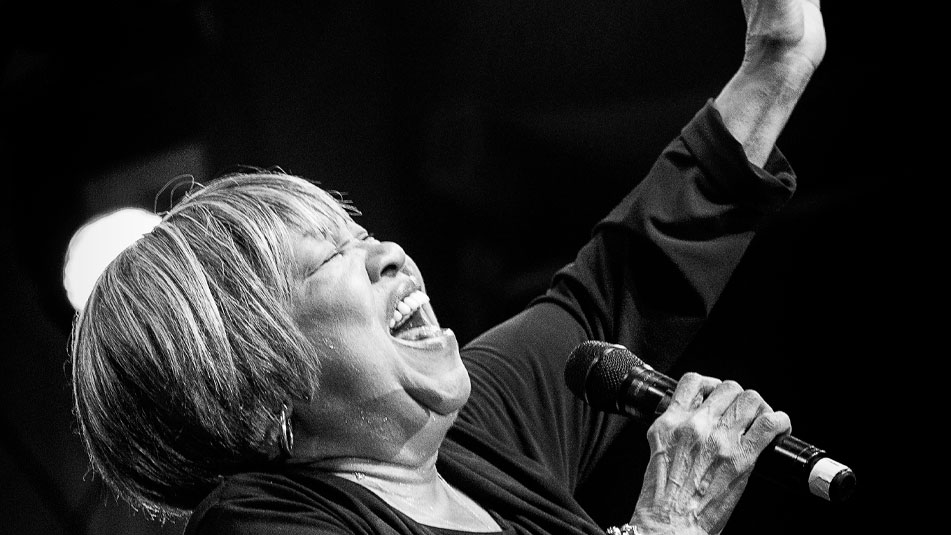
Mavis Staples
Mavis Staples is an icon, but when she picks up the phone – you might as well be speaking to your favorite aunt.
I recently had the chance to interview Staples, who spun one story after another – about her father, the late “Pops” Staples; about Mahalia Jackson, her idol; about Miles Davis, Dizzy Gillespie and her friend Cannonball Adderley, who she called “Candy.” Thinking back to early childhood – when she was “a stair-step,” as she puts it – she recalled her life-changing experiences at Mount Eagle Baptist Church on the South Side of Chicago. She described her mother’s homemade banana ice cream with such vividness, as if she were tasting it right now. She remembered the moment she became lead singer of the Staple Singers – but credited Pops’ guitar and the voice of her sister Cleotha as the special sauce that gave the group its sound.
At age 80, Staples looks back on her life with infectious warmth and humor. After phoning her at home in Chicago, I spoke about Staples with Jeff Tweedy, of the band Wilco, who produced three of her most recent albums. He confirmed what I was feeling about his friend: “I think everybody that I’ve ever met that has worked with Mavis, or has even just met Mavis, feels like they have a special connection with her,” Tweedy said. “She makes everybody feel that way. She makes everybody feel special and like they have a really close bond, and almost immediately they feel that way. And I’ve always described it as `imagine what you think an angel would be like,’ and I think that’s what Mavis is functionally in this world. As an angel, she makes everybody better; makes everybody feel better; makes everybody feel a little bit safer. It’s a life-affirming experience to be around Mavis. And it’s across-the-board – there don’t seem to be people that have an immunity to Mavis’ charm. Because why would you? Why would you resist it?”
See what you think, as you read this transcription of my conversation with Staples, who is about to be honored with a Lifetime Achievement Award from SFJAZZ (where she performs Jan. 30-Feb. 1). You may just feel what I felt, and what Tweedy describes, as she tells her stories and reflects on her remarkable life.
Q: What was it like to hear the sound of a church choir when you were a youngster? Was it a powerful feeling?
A: Oh, when you hear that gospel choir -- man, all of us children, we would take our jump ropes to church with us on Sundays. And when it got time for the minister to come up to preach, we would leave the building! We would go outside and jump rope – because we just wanted to hear that choir sing.
It’s a feeling that stays with you for the rest of your life.
Q: Did you ever have a eureka moment -- when you realized you were born to sing, and that you would spend your life singing?
A: I guess it was when I was already singing in church, and I saw the people coming around crying – some were crying, some were smiling, and wanted to shake my hand. I was just a little girl, and I felt like I was doing something good.
At first, when I saw the people crying, I asked my mother: I said, “Mama, what did I do to those people to make them cry?” And she said, “Baby, you singin’ -- they’re crying because they love what you’re doing. You’re makin’ ‘em feel good.” And when she said “makin ‘em feel good,” it made me feel happy. And that just let me know that this is what I wanted to do. I wanted to sing.
Q: How old were you?
A: I was nine years old.
Q: Let’s go back to the beginnings of the Staple Singers. You’ve said the group began one day when your father told you and your siblings to sit down on the living room floor – he said you were going to sing together. Is that a vivid memory for you?
A: Yes. Oh, I remember that like it was yesterday. I can actually see us. I remember it so well. My father had been singing with an all-male group called the Trumpet Jubilees. And Pops, he would go to rehearsals – there were six guys, six of them. He’d go to rehearsals, and they might be two at rehearsal, or three. They wouldn’t come. He did that about three times, and that last time he came home, he was so disgusted. He went straight to the closet. Pulled down a little guitar that he had, you know, and he called us children into the living room, set us on the floor in a circle. And our Aunt Katie lived with us, and she asked him, she said, “Well, Pops, what are you doing?”
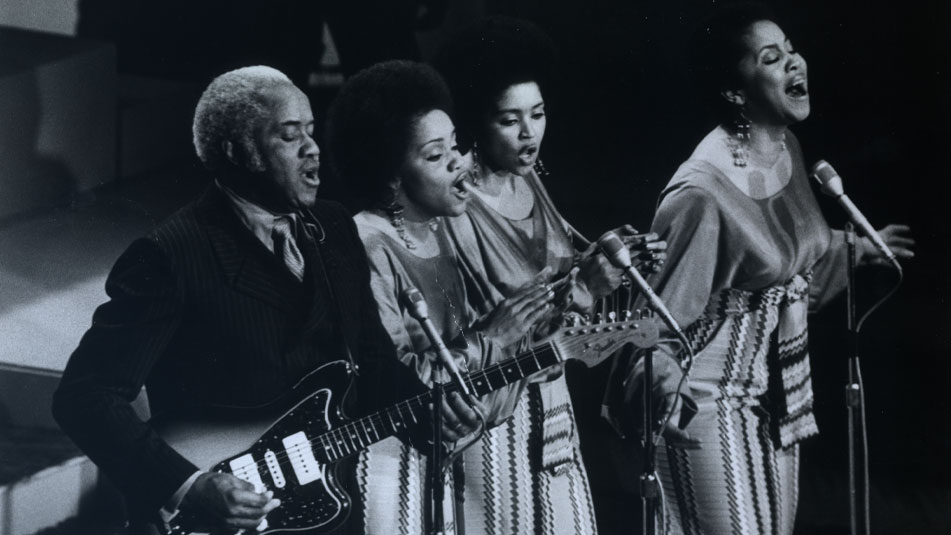
The Staple Singers
He said, “Katie, I’m gonna sing with my children.” And Pops started giving us voice parts to sing that he and his sisters and brothers would sing when they were growing up in Mississippi. And I was really singing baritone, when I was small. My brother Pervis was singing the lead; Pervis’ voice was like Michael Jackson. So we rehearsed like that, but, all of a sudden one day, Pervis’ voice was too heavy; you know, Pervis had reached puberty. And Pops said, “Mavis, you’re gonna have to sing the lead, because Pervis can’t get up high anymore.” And I said, “Oh, no, Daddy, I don’t wanna sing lead. I think baritone is the prettiest voice in the background; I wanna sing baritone.”
And he had a little piece of cut belt that he would use to hit my legs when I was bad, and Pops reached over for that little piece of belt, and I said, “OK, daddy, I’ll sing! I’ll sing the lead!”
Q: What happened next?
A: Well, my Aunt Katie who lived with us – she came through one night, and she said, “Shucks, y’all sound pretty good. I believe I want you to sing at my church Sunday.” And Lord, we were so happy we were going to be singing some place other than on the living room floor. And we sang this song that my father taught us; the very first song he taught us was “Will the Circle Be Unbroken.” We sang “Will the Circle Be Unbroken” at church, and the people started clapping – and people had to tell us, “They’re clapping you back. You have to sing another song.” But that was the only song he’d taught us all the way through. So we had to sing “Will the Circle Be Unbroken” three times. And Pops said, “Shucks, these people like us. We’re going home and learn some more songs.”
And history was being born. That’s how we got started.
Q: Who would ever have imagined where it would lead?
A: I know! We were really just at first singing to amuse ourselves. We weren’t singing for a career. But the more we sang in churches, and people liked us so much – when I was 13, we started recording. This lady had told Pops – she was at that church that Sunday; Vivian Carter from Veejay Records. And Vivian called Pops; she says, “Staples, you and those children need to be on record.” And Pops said, “No, Vivian, I don’t know nothing about those records, so I’m not going to let my children sing.”
So people started telling him – Sister Mahalia Jackson, the Soul Stirrers and the Dixie Hummingbirds, they would tell Pops about the record business, you know. And when I turned 13, he called Vivian and said, “All right, Vivian, I’m gonna let my children make a record now.” And we went in the studio and we recorded “Uncloudy Day.”
“Uncloudy Day” sold so much -- Vivian called Pops one day. She says, “Staples, this record is selling like an R&B.” (It sold over a million copies.) And we just kept going from there. All through my high school days, I would miss Monday in school. Because we would drive somewhere, you know -- New Orleans, Memphis, different places. So I couldn’t get back to school until Tuesday. And Pops would tell the teacher to “give Mavis some homework, cuz she won’t be back Monday.” And that was the best time of my life, man.
Q: When you look back at your life – singing next to Martin Luther King, for instance -- are you surprised by all your experiences? Does it feel like a dream? Or does it just seem normal?
A: No, it is surprising, and it is like a dream. Because it was something that I was not expecting. I never, never thought that we would go as far as we did. And it wasn’t easy, because we were singing gospel and we weren’t heard a lot – gospel music was played on the radio; .you had to be up at like 4 o’clock in the morning if you wanted to hear the gospel.
But we sang our songs, and we started being invited to jazz festivals, to blues festivals, folk festivals, and we just went… haywire! It was, it is, it’s still a surprise to me that when I go out -- 70 years I’ve been singing these songs, and people still want to hear me. It makes me feel – my heart is just bubbling, you know. Most of the time I’m so happy; I must be the happiest old girl in the world.
I am! Because, my goodness, I don’t have to tell you; it’s been documented that I’m 80 years old now. And I declare, I never thought I’d be singing this long and that people – they come out, my audience is still from 8 to 80. The young kids, the college students want to hear it. And I talk to Pops all the time, I tell him, “Well, Daddy, I know you’re watching me. I’m still at it.”
And I can’t stop. I’m doing what I love. And I’m grateful to God; he gifted me. He gifted me with my voice. I don’t know any music. I don’t even know what key I sing in. I would just sing from ear; wherever Pops would hit his guitar, that’s where I’d start singing. And I’ve never had any vocal, voice lessons. I’m just grateful. I’m just so grateful that I’m still here and I’m happy. I’m just as happy as (Staples breaks into giggles) – I’m still having fun. I want the people, when I go onstage, I want to give them something. I want them to feel better than they felt when they came there.
Q: People use all kinds of adjectives to describe your voice. How do you describe your voice?
A: Let me tell you first – I used to have a lot of fights about my voice. I used to beat up kids! They would say, “You sound like a boy.” And I’d get mad. But my voice, it comes from my mother’s side of the family. My mother and her mother had very strong voices. And I’m just – it’s just, I don’t have the little teeny soprano voice. I was in the a cappella choir in the school and the teacher would tell me, “Mavis, you’re in the basement. You’re singin’ with the boys. Come up.” And I would tell him, “I’m sorry, sir, I cannot sing what those girls are singing. My voice can’t get up there.” I would have to strain to get up there. So I left the a cappella choir.
I don’t know how I would describe my voice, but I – I love it. My voice is much lighter than it used to be. When we first started on the road, I loved to call down to room service. I would call room service, and I’d order my breakfast, and the lady would say, “Yes, Mr. Staples. Yes, Mr. Staples.” And for a long time I took it, but then it went on for so long; I had to start telling ‘em, “I’m a lady. I’m not a mister.” And they’d say, “Oh, I’m sorry. I’m sorry, ma’am.”
But it has taken me -- it has brought me all these years and brought me all this joy. I wouldn’t trade my voice for nothing in the world.
Q: What about your father’s guitar? How would you describe the sound of his playing?
A: My father’s guitar was a different sound from any guitar. Pops, he learned from a blues guy, Charley Patton. He learned guitar from Charley. Pops, when he was a boy, they lived on the Dockery Farm (in Dockery, Mississippi) and Charley Patton was there. Howlin’ Wolf was there. But Pops, he told us about how he would hear this man playing the guitar, and he loved it so much. He was makin’ 10 cents a day, and he would take that dime to the hardware store where they were selling guitars, and he put it in the layaway.
He got that little guitar and he taught himself. But he liked Charley Patton’s style. And so after he was playing for maybe a couple of years, he went in the music store – this was in Chicago -- and he saw this tremolo. He put the tremolo on the guitar and, you know, let me tell you – Elvis Presley told me one time, he says, “I like the way your father plays that guitar. He plays a nervous guitar.” (She laughs.) He said, “nervous.” I didn’t wanna tell him; it’s not nervous! That’s my father’s tremolo on that guitar.
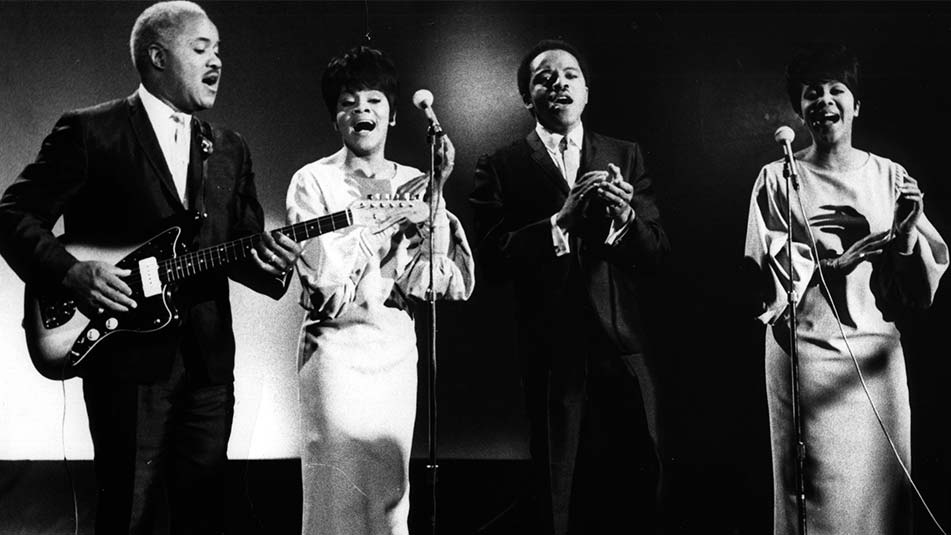
The Staples Singers w/ Pops on Guitar
But I loved the sound of Pop’s guitar. He and B.B. King, they were tight buddies. And do you know, for years, my sisters and I, we’re singing gospel with Pops, and we didn’t realize that Pops was actually playing the blues on his guitar? And that made me realize – I told Daddy, I said, “Why are they inviting us to these blues festivals and jazz festivals?” He says, “Mavis, you listen to our music -- you will hear jazz, you will hear blues, you will hear every kind of music in our music.” And I did. And some of it sounds like we’re singing country. You know, we just had a different, unique sound. And that comes from my father and his family. There were 14 of them; seven boys and seven girls. And the sound that they had, that’s the sound he gave us.
But I credit my father. I credit the Staple Singers’ fame to my father’s guitar and my sister Cleotha – her voice. Pops had her singing – sometimes she would be singing in a minor key against the rest of us, and it worked. I think that’s what made the Staple Singers sound so different; the old-time songs we would sing. You know, when we first went on the road, some of the songs, the sound Pops gave us – people thought we were old people. They didn’t think we were little kids. You know, we were little stair-steps; I was eight, nine years old. And I was the youngest. So they thought we were older. They were shocked when they saw we were kids. And my voice on “Uncloudy Day” – I’m singing a lady’s bass. (Staples drops her voice and sings):
Well, well, well-a-oooh! Lord, they tell me now…
And people – the disc jockeys would say, “This is little Mavis Staples singing this” – and people would say, “That’s not a little girl. That’s got to be a man or a big fat woman.” And so (giggling), we were fooling the people. We’d go to places and they would tell us, “Pops, these people have been bettin’ on your daughter. They bet their money that that’s not a little girl.”
And when we sang “Uncloudy Day,” all of us would sing it down in harmony together. And then my part would come in. So, my brother, he would step up like he was about to say that part, the bass part. And you could hear the people all over the auditorium: “I told you that wasn’t no little girl. I told you.”
And then I’d step in, I’d sing:
Well, well, well-a-oooh!”
And boy, they would go wild. One man told me, he was mad at me – he just got mad: “Little girl! I bet my whole paycheck on you.” And Pops says, “Why you doin’ that? You shouldn’t a done that; that’s her.”
I was just a little, short skinny girl with this big voice. And man, oh, we just had so much fun.
Q: Hey, a minute ago you were describing how your dad would say to you, “You will hear blues, you will hear jazz in what we do…” Since SFJAZZ is giving you this award, I thought I’d ask you about jazz. Because Chicago isn’t just a great gospel town and a great blues town; it’s a great jazz town. When you were growing up, did you know any jazz musicians? Did you hear jazz? Are you a jazz fan?
A: Oh yes, I love jazz. My sister Yvonne, she introduced me to jazz. She was a sure-enough jazz fan. And Dinah Washington – Dinah Washington lived right down the street from us. We would listen to her, and Dakota Staton, and when Jimmy Smith started, he was one of our favorites.
And I met – I was so glad to meet Miles Davis. Miles Davis was so comical. You know (giggling again), he told me one time; my sister Yvonne and I, we went to his show. So we went downstairs to his dressing room, and we were talking to him. I had this necklace on, and it was a unisex. It’s a beautiful necklace. And he told me, he says (lowering her voice in imitation of Davis), “Gimme that necklace.”
I said, “No, I’m not givin’ you my necklace.”
He says, “You give me that necklace!”
“I’m not givin’ you my necklace.”
And Yvonne says, “Mavis, give it to him.”
I said, “No, Yvonne!” I said, “No.”
He looked at me, he says, “You gonna give me that necklace.” I said, “I bet you I don’t.”
And we were just back and forth, back and forth. And I tell you, I wish I had given him that necklace. Because it wasn’t a month after that, Miles Davis passed away. And I said, “Oh, my God, why didn’t I give him the necklace?” Because every time I wear it – I still have it – I think about Miles.
And I tell you, I – Nina Simone; we had lots of jazz. Dizzy Gillespie told me off one time. We were in New York, and I asked Dizzy, I said, “Dizzy, do you know anyone here in New York who can give me some vocal training?”
And he started cursing. He said, “You don’t need that! You don’t need it! You already got it! You don’t need no vocal teacher. You don’t need nobody teaching you nothin’.” And he said some words that I won’t repeat. But I told him, I said, “Okay, Dizzy. Okay. Thank you.”
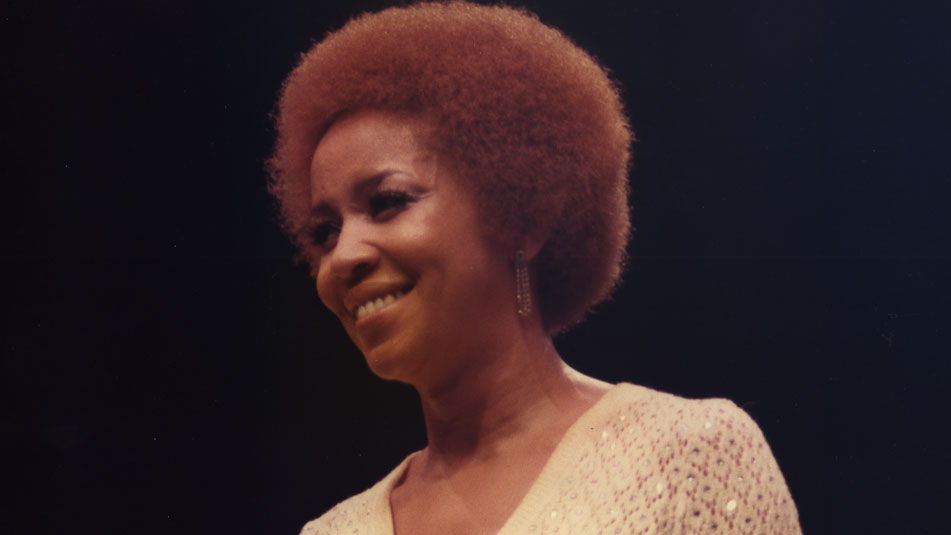
Mavis Staples
But he really told me off good. He said, “You gonna mess up. You already sound great.”
Q: Did you know Cannonball Adderley?
A: Oh, yes, we knew Cannonball! We called Cannonball “Candy,” and he recorded “Why Am I Treated So Bad.” And he and Nat – we knew them very well. They were just friends; Cannonball, he was such a sweetheart.
When he recorded “Why Am I Treated So Bad” – it’s a live version. My father wrote “Why Am I Treated So Bad.” And when we heard that, boy, we just played that over and over and over. It sounded so good. And that guy – I can’t remember his name – on the piano? He was great.
Q: Joe Zawinul?
A: Yeah, he was great. But Cannonball, the last time I saw him, we were all in Detroit, and we were all going to Aretha’s house for dinner. And we got over there, and, boy, we had fun. We had fun that night, but that was the very last time I saw my friend Cannonball. Nat didn’t make it; he didn’t make it over there. I understand Nat has a son who’s been doing some producing. I’ve never met him, but I certainly would like to.
Q: I’m glad I asked you about jazz! Hey, can you describe what the gospel scene was like on the South Side of Chicago when you were a girl? In Mavis!, the documentary about you, you describe backyard spaghetti parties at your house -- people like Sam Cooke and Jerry Butler would come?
A: Well, see, that’s the thing. Nobody knows a lot about my mother. My mother was, I think, the world’s greatest cook. She was good, and everybody would come to our house: Ray Charles, Stevie Wonder, everybody would come – Nancy Wilson. And Nancy would call my mother when she was coming to Chicago, and give her her order, what she wanted to eat. She wanted cream corn.
But every Fourth of July, Mama and my sister Yvonne, they would be up like 4 o’clock in the morning, putting the barbecue on and all this. We had so much food – barbecue. Mama would make spaghetti – spaghetti and meatballs and potato salad and cole slaw. And she would make this homemade ice cream; she’d make banana homemade ice cream.
And everybody would come: Curtis Mayfield, the Emotions, Jesse Jackson, Jerry Butler, Sister Mahalia Jackson, Albertina Walker.
That backyard would be loaded with celebrities. And, man, they would chow down. Sister Mahalia Jackson – you know, she was the greatest gospel singer in the world; she was my idol. Now that was my idol. And she would tell me, “Baby, come here baby.” I would go, and she would say, “Get me a little more of that ice cream.” I said, “Yes, ma’am. I’ll get you some!”
But yeah, man, we had a time in our backyard, every Fourth of July.
Q: How old were you?
A: When it started, I was a teenager, I was like 18, 19, but it kept going ‘til I was maybe about 30. We would be home every Fourth of July; we never had any jobs on Fourth of July. And we looked forward to that, to the barbecue in the Staples’ backyard.
Some of the people we were just surprised to see. Some of them would come from out of town. The Womack Brothers? Bobby Womack and his little brothers – the little baby boy just made himself sick; he would eat so much barbecue and spaghetti.
And Mama would have baked beans. You know, it may have started when I was more like 19, because I wasn’t in high school. I was out of school.
But it went on for about 10 years. Disc jockeys would come! And my mother would make the best sweet potato pies. And Brother Ray Charles told her, he says, “Sister, you know, we could start a franchise with these sweet potato pies! We could have big ones, and little ones.” And he would get shaking; he was just rockin’; he would be there rockin’. And mama, she would always make him an extra pie to take back to the hotel with him.
And my father, he would take sweet potato pies to the disc jockeys. So one disc jockey here in Chicago, E. Rodney Jones, he came home one day. And at that time, they had something called payola. And Rodney Jones, he would get on the radio, he’d say, “Oh, I got one of Mama Staples’ sweet potato pies.” He’d say, “But I tell you, the Staple Singers, they don’t need no payola, cuz they got pie-ola.” (Laughing)
I’m remembering stuff. You’re making me remember stuff. I tell you -- aw shucks, I haven’t thought about this in years. But it feels good. Because everything I’m talking about, I can visualize it. I can see us in the backyard. It’s just a wonderful feeling. Yes.
Look: “payola, pie-ola.” My mother’s name was Oceola; she had an Indian name, cuz we got some Cherokee in us.
Q: Do you have a sense of how you fit into the history of American music – the impact your family has had?
A: You know, I feel like we have done what we’re supposed to do. Singing songs. Informative messages. You know – singing songs to try to fix the world. We always wanted to sing a song – if we saw something wrong, we wanted to have some lyrics and a song to sing to try to fix it, try to make it better.
And I do feel like we have contributed to the music world. We’ve done our part. We haven’t been singing what everyone else has been singing. We’re not the best in the world. But our little bit, what we had to offer – our gospel songs; our gospel songs, our beginnings; that was our gospel songs. And we would be telling the truth. Gospel is truth. And through our gospel songs, we were telling you the truth. And through our message songs, we are still telling you the truth. And we just want to be a beacon. We want to help, we want to be -- say that the Staple Singers did what we could to help us be better, help us love one another, help us come together, to give us hope, give us a light to shine on us. That’s what my family has always been about, and we just wanted to spread love – spread love, and love one another. That’s my motto: Do unto others as you would have them to do unto you.
Q: I talked to Bonnie Raitt the other day. She told me you’re like her pastor. Now I understand why.
A: Oh! She’s my baby sister. And, look, you know who loved Bonnie Raitt? My father loved Bonnie Raitt. I used to get jealous when Bonnie would come around, cuz when Bonnie was around, Mavis just didn’t exist. Pops would say, “Look at her, Mavis. Ain’t she something?” And I’d say, “Yeah, Daddy. Yeah. She’s great.”
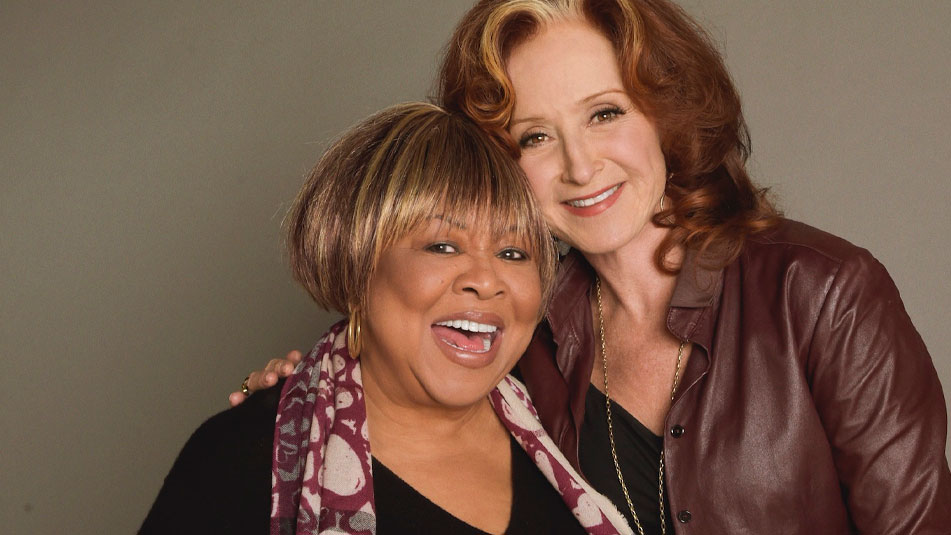
Mavis Staples and Bonnie Raitt
But, yeah, she’s my baby sister. Bonnie came to see Pops; she came to the house when he was sick. And Pops gave her a guitar, and we sat around in the living room; the whole family was there. And we sang songs all the while Bonnie was there. And Pops didn’t feel good. At one point, he went upstairs, and Bonnie followed him upstairs and sit on the bed. And she came with, “Well now, nobody can’t tell me I haven’t been in Pops Staples' bed.” I’m, “Okay, Bonnie, you got it.”
SFJAZZ Gala 2020 honors Mavis Staples with a Lifetime Achievement Award on JAN 30.
The Gala concert is sold out, but limited After Party tickets featuring Con Brio, The Suffers, and Tiffany Austin are available.
A staff writer at SFJAZZ, Richard Scheinin is a lifelong journalist. He was the San Jose Mercury News' classical music and jazz critic for more than a decade and has profiled scores of public figures, from Ike Turner to Tony La Russa and the Dalai Lama.
